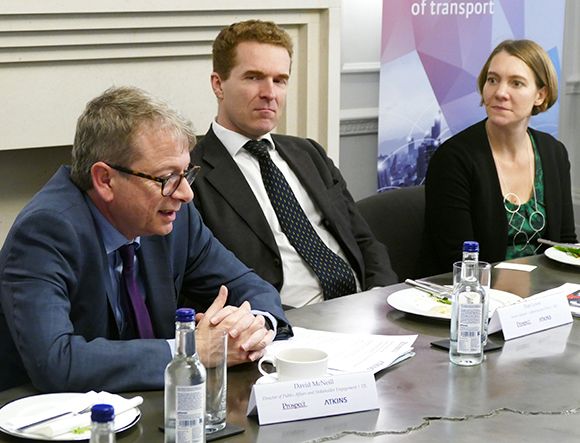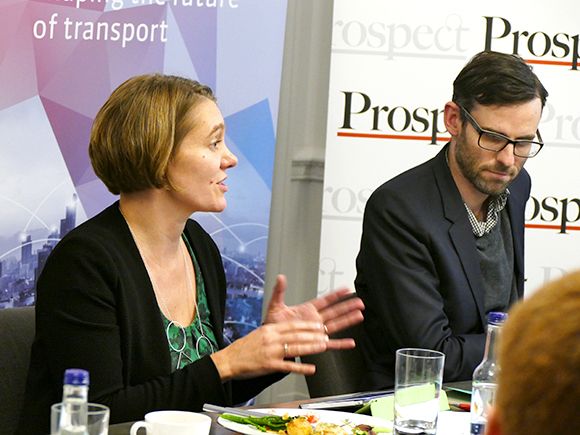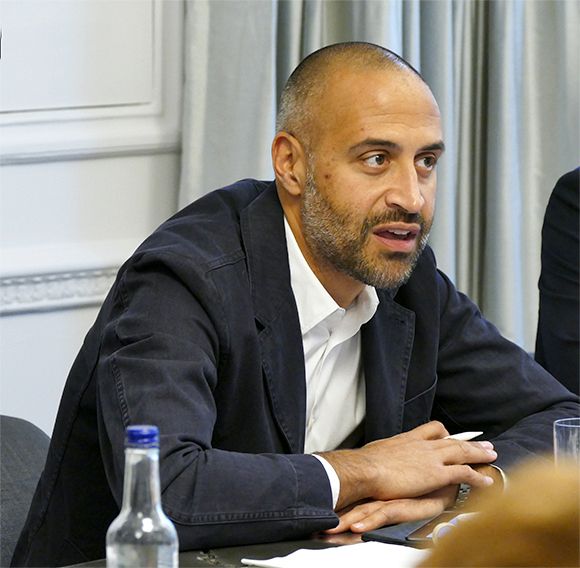Prospect’s Future of Cities report was launched in May this year, in collaboration with the civil engineering consultancy Atkins and the Government Office of Science. Cities are a crucial driver of economic growth and whilst London remains the economic centre of the UK, there’s an increasing recognition that other urban areas can play a much bigger role in driving the economy forward. With Whitehall serious about devolving more powers to localities and with technology advancing rapidly, Prospect has held a series of roundtables and events bringing together the public, private and voluntary sectors to map out the road ahead.
Last week’s discussion, in conjunction with Atkins, called "Data as infrastructure: how can data drive growth in devolved regions?", was the final event in the series and also a part of Atkins' intelligent mobility week. The discussion opened with Jason Pavey, Market Director for Local Transport at Atkins, setting the scene. There is an increasing recognition—he argued—that transport and other infrastructure is no longer just about the physical world. Although physical infrastructure remains obviously crucial, there’s a growing role for data infrastructure alongside this and it needs to be taken into account at the early stages of planning and policy formulation.
From left to right: Madden, Pavey and Wilson
The “vision” is clearly there in policy circles with all the talk of connectivity and the power of big data, but it remains to be seen if the steps can be taken that will operationalise that vision in the real world.
To take just one example, he asked what would be the role of local transport authorities as autonomous vehicles developed? Would they be an enabler or even a regulator of this change? Or would they just be spectators? In many ways the broader—and still unresolved—question at the heart of this was, what are the roles of the public and private sector in this new technologically changed world of transport planning?
Picking up on some of these points, Alan Wilson, the head of the Alan Turing Institute and one of the contributors of the Future of Cities report, noted that for many specific transport programmes the issue was one of scale. HS2, for example, is a UK-level project that requires UK-level planning, but many of the projects of the future will be at the city level.

When considering the use of data, he noted that there was spectrum from slow to fast data and at the faster end, things were speeding up. Many data sets still rely on the national census which is conducted just once a decade. But whereas previously it was possible to get market researchers to conduct a modes of transport study to get more timely data, this could often now be acquired almost instantly using mobile phone data or payment information.
The real challenge now is how to make better use of this data whilst recognising that telecoms and data infrastructure are today integral to physical infrastructure and when the existing planning system is not fit for purpose.

Responding to the idea that planning has be done at the right level, Peter Madden, the Chief Executive for the Future Cities Catapult, noted that decisions work best when taken at the right level of spatial geography. The problem arises when local authorities are taking decisions where the benefits or costs of any policy action spill over into other geographies. The push towards more city-level governance should help counteract this.
It was widely recognised by participants at the roundtable that Transport for London was a beacon of best practice when it came to using data. David McNeill, their Head of Public Affairs and Stakeholder management, outlined how the decision to make most of their data open source had not been uncontroversial.

Putting the data in the public domain allowed third party developers to make best use of it and they were often nimbler than large public sector organisations. Perhaps more importantly, it was easier for the private sector to experiment with this data. If a private sector developer launches a transport related app which proves to be not popular, it is much easier for them to cancel it. By contrast, an app provider by the public sector can be much harder to drop—a minority of frustrated customers may demand that it is retained. TfL though —as a large organisation—is in a stronger position. Making data open source is not cheap or straightforward and other public sector organisations may lack the scale or resources to follow this path.
Dan Lewis, from the Institute of Directors, noted that there was often a competition policy angle to open source data than it has yet to be addressed. The company—or local authority—that collects the data may have first mover advantage in developing ways to use it which could potentially crowd out other, potentially more innovative, developers.
It was widely noted that many of these emerging issues about the ownership and use of data raise legal—and even ethical—issues about privacy and who owns the information in the first place.

Emily Georghiou from Age UK put some of these ethical issues in the spotlight when she raised the notion of where older people fit into this new data-driven world of planning services and transport. There was a tendency, she argued, in the UK, to downplay the agency of older people in decision making.
London Deputy Mayor and former lawyer Matthew Ryder argued that there was a need for more legislative certainly around privacy issues. At the moment there is a risk that business models—including in transport—would develop using data that it is later clarified is covered by privacy laws. To avoid this, there needs to be greater certainty now on exactly how and which data can be used in planning by the public and private sectors.

Julian Francis from the Association for Consultancy and Engineering raised the wider issue that data needs to be better plugged into policymaking at the local authority area. He stated that in many authorities policy and strategy functions were often separated from data analysts and whilst good data was being collected, it didn’t necessarily feed through into better decision making.
The general consensus that emerged around the meeting was that there were islands of best practice in the use of data around the UK. The real challenge now is to build up those islands to spread better practice which will require both more resources and skills but also a re-examination of our planning system. A re-examination that is given extra impetus by the coming wave of regional devolution.
This discussion was the last event of this year’s Future of Cities program, coinciding with Atkins’ Intelligence Mobility Week. Please click here to learn more about intelligent mobility and here for an article by Mark Prisk MP on the development of smarter cities. The full version of Prospect’s Future of Cities report can be found here.
For speaker and partnership opportunities, please contact david.tl@prospect-magazine.co.uk














